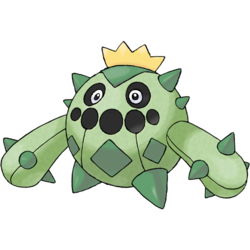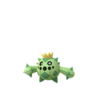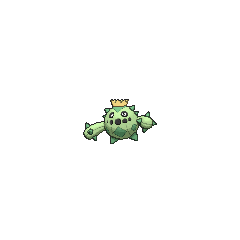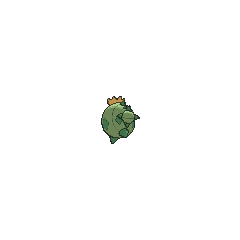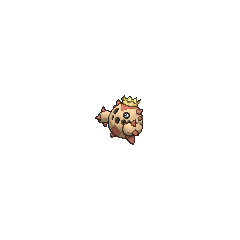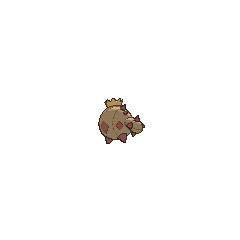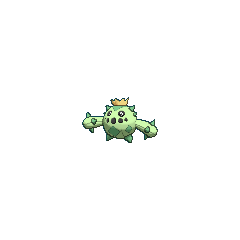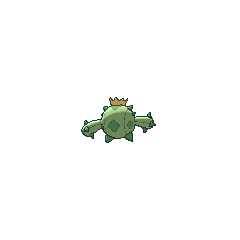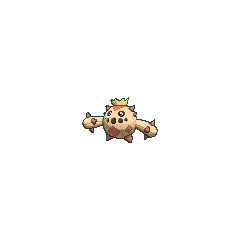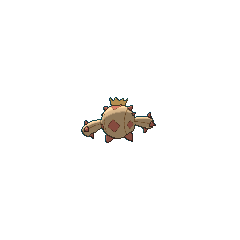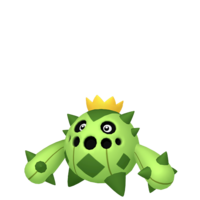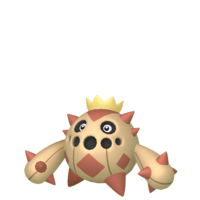From Bulbapedia, the community-driven Pokémon encyclopedia.
|
|
| Line 442: |
Line 442: |
| * James's Cacnea is the only one of this species to have appeared in the {{pkmn|anime}}. | | * James's Cacnea is the only one of this species to have appeared in the {{pkmn|anime}}. |
| * Cacnea and its evolution are the only {{type|Grass}} Pokémon in the {{egg3|Human-Like}}. | | * Cacnea and its evolution are the only {{type|Grass}} Pokémon in the {{egg3|Human-Like}}. |
| | * Cacnea has no [[Egg Moves]] in [[Generation IX]], even though most of the ones it had previously would still be able to be inherited by it otherwise (due to both a possible parent and the move itself being present in the game). It is unknown if this is intentional. |
|
| |
|
| ===Origin=== | | ===Origin=== |
Revision as of 18:18, 11 December 2022
Cacnea (Japanese: サボネア Sabonea) is a Grass-type Pokémon introduced in Generation III.
It evolves into Cacturne starting at level 32.
Biology
Cacnea is a green, bipedal Pokémon with a round body and cactus-like striations. It has a dark green rhombus shape above its face, and six dark green rhombus shapes that ring around its waist. It has dark circles around its eyes, and its mouth composed of several similar circles. It has two dark green spikes on each side of its head, along with a yellow flower bud on top of its head. It has two club-like arms that are ringed with dark green spikes, and its two stubby legs are dark green and conical.
Cacnea uses its thorny arms like hammers to attack its opponents. Prior to Generation V, Needle Arm was its signature move. It is able to live in deserts for 30 days without any water, due to its body being able to store moisture. The beauty and fragrance of its yellow flower depend on the harshness of its environment. This flower releases a strong aroma to attract prey. When prey approaches, Cacnea shoots sharp thorns to bring it down.
In the anime
Major appearances
Cacnea debuted in A Poached Ego!. James caught it after he had to release his Weezing, alongside Jessie's Arbok, to protect a group of Ekans and Koffing that were freed from a Pokémon Poacher. In Once There Were Greenfields, James left Cacnea in the care of Gardenia, who agreed to train it to master Drain Punch.
Minor appearances
Pokédex entries
In the manga
Pokémon Adventures
Cacnea debuted in Creepin Past Cacnea, where a wild one battled alongside a Duskull, Wingull, Volbeat, and Beautifly against Norman, but they were quickly defeated by his Pokémon.
A Trainer's Cacnea appeared in Always Keep Whiscash on You for Emergencies.
Pokémon Battle Frontier
A Cacnea appeared in Battle Between Student and Master!.
In the TCG
- Main article: Cacnea (TCG)
In the TFG
One Cacnea figure has been released.
Game data
Pokédex entries
| This Pokémon was unavailable prior to Generation III.
|
| Generation III
|
|
Hoenn
#119
|
|
Kanto
#—
|
| Ruby
|
Cacnea lives in arid locations such as deserts. It releases a strong aroma from its flower to attract prey. When prey comes near, this Pokémon shoots sharp thorns from its body to bring the victim down.
|
| Sapphire
|
The more arid and harsh the environment, the more pretty and fragrant a flower Cacnea grows. This Pokémon battles by wildly swinging its thorny arms.
|
| Emerald
|
Cacnea live in deserts with virtually no rainfall. It battles by swinging its thick, spiked arms. Once a year, a yellow flower blooms.
|
| FireRed
|
It prefers harsh environments such as deserts. It can survive for 30 days on water stored in its body.
|
| LeafGreen
|
|
|
|
|
| Generation V
|
|
|
Unova
#—
|
| Black
|
By storing water in its body, this desert dweller can survive for 30 days without water.
|
| White
|
| Black 2
|
By storing water in its body, this desert dweller can survive for 30 days without water.
|
| White 2
|
|
|
| Generation VI
|
|
Kalos
#—
|
|
Hoenn
#124
|
| X
|
It lives in arid locations. Its yellow flowers bloom once a year.
|
| Y
|
It prefers harsh environments such as deserts. It can survive for 30 days on water stored in its body.
|
| Omega Ruby
|
Cacnea lives in arid locations such as deserts. It releases a strong aroma from its flower to attract prey. When prey comes near, this Pokémon shoots sharp thorns from its body to bring the victim down.
|
| Alpha Sapphire
|
The more arid and harsh the environment, the more pretty and fragrant a flower Cacnea grows. This Pokémon battles by wildly swinging its thorny arms.
|
|
|
|
|
|
|
| Generation IX
|
|
|
Paldea
#252
|
| Scarlet
|
It prefers harsh environments, such as deserts. It can survive for 30 days on water stored in its body.
|
| Violet
|
It lives in arid locations. Its yellow flowers bloom once a year.
|
|
|
Game locations
| This Pokémon was unavailable prior to Generation III.
|
|
|
|
|
|
|
|
|
|
|
|
|
In side games
| This Pokémon was unavailable prior to Generation III.
|
|
|
|
|
|
|
|
|
|
|
|
|
In events
Held items
Stats
Base stats
| Stat
|
Range
|
| At Lv. 50
|
At Lv. 100
|
50
|
|
110 - 157
|
210 - 304
|
85
|
|
81 - 150
|
157 - 295
|
40
|
|
40 - 101
|
76 - 196
|
85
|
|
81 - 150
|
157 - 295
|
40
|
|
40 - 101
|
76 - 196
|
35
|
|
36 - 95
|
67 - 185
|
Total: 335
|
Other Pokémon with this total
|
- Minimum stats are calculated with 0 EVs, IVs of 0, and (if applicable) a hindering nature.
- Maximum stats are calculated with 252 EVs, IVs of 31, and (if applicable) a helpful nature.
|
Pokéathlon stats
Type effectiveness
| Under normal battle conditions in Generation IX, this Pokémon is:
|
|
|
|
|
|
|
|
|
|
|
|
|
Learnset
|
|
|
|
- Bold indicates a move that gets STAB when used by Cacnea
- Italic indicates a move that gets STAB only when used by an Evolution of Cacnea
- Click on the generation numbers at the top to see level-up moves from other generations
|
|
|
|
|
- Bold indicates a move that gets STAB when used by Cacnea
- Italic indicates a move that gets STAB only when used by an Evolution or an alternate form of Cacnea
- Click on the generation numbers at the top to see TM moves from other generations
|
|
|
|
|
- Moves marked with an asterisk (*) must be chain bred onto Cacnea
- Bold indicates a move that gets STAB when used by Cacnea
- Italic indicates a move that gets STAB only when used by an Evolution of Cacnea
- Click on the generation numbers at the top to see Egg moves from other generations
|
Side game data
|
|
|
|
|
|
|
|
|
|
|
Pokémon Rumble Rush

|
Walking Speed: 1.97 seconds
|
Base HP: 48
|
|
| Base Attack: 71
|
Base Defense: 45
|
Base Speed: 60
|
|
|
|
|
|
|
|
|
|
Evolution
Sprites
| This Pokémon was unavailable prior to Generation III.
|
|
|
|
|
|
|
|
|
|
|
|
|
Trivia
- Cacnea and its evolved form's Egg Group (Grass and Human-Like) are unique.
- Cacnea shares its category with Maractus. They are both known as the Cactus Pokémon.
- James's Cacnea is the only one of this species to have appeared in the anime.
- Cacnea and its evolution are the only Grass-type Pokémon in the Human-Like Egg Group.
- Cacnea has no Egg Moves in Generation IX, even though most of the ones it had previously would still be able to be inherited by it otherwise (due to both a possible parent and the move itself being present in the game). It is unknown if this is intentional.
Origin
Cacnea is based on a barrel cactus and possibly a jack-o'-lantern.
Name origin
Cacnea may be a combination of cactus and its Japanese name.
Sabonea may be a combination of 仙人掌 saboten (cactus) and debonair.
In other languages
| Language
|
Title
|
Meaning
|
 Japanese Japanese
|
サボネア Sabonea
|
From 仙人掌 saboten and debonair
|
 French French
|
Cacnea
|
Same as English name
|
 Spanish Spanish
|
Cacnea
|
Same as English name
|
 German German
|
Tuska
|
From Kaktus
|
 Italian Italian
|
Cacnea
|
Same as English name
|
 Korean Korean
|
선인왕 Seoninwang
|
From 선인장 (仙人掌) seon-in-jang and 왕 (王) wang
|
 Mandarin Chinese Mandarin Chinese
|
刺球仙人掌 Cìqiúxiānrénzhǎng*
沙漠奈亞 / 沙漠奈亚 Shāmònàiyǎ / Shāmònàiyà*
|
From 刺 cì, 球 qiú, or 刺球 chhì-kiû, and 仙人掌 xiānrénzhǎng
From 沙漠 shāmò and transcription of Japanese name
|
 Cantonese Chinese Cantonese Chinese
|
刺球仙人掌 Chikàuhsīnyàhnjéung*
沙漠奈亞 Sāmohknoih'a*
|
From 刺 chi, 球 kàuh, or 刺球 chhì-kiû, and 仙人掌 sīnyàhnjéung
From 沙漠 sāmohk and transcription of Japanese name
|
|
|
|
| More languages
|
 Thai Thai
|
ซาโบเนีย Sabonia
|
Transcription of Japanese name
|
|
|
|
Related articles
External links

|
This Pokémon article is part of Project Pokédex, a Bulbapedia project that aims to write comprehensive articles on each Pokémon species, as well as Pokémon groups and forms.
|
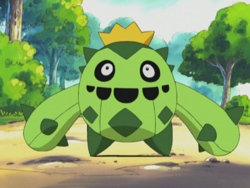

 For other sprites and images, please see Cacnea images on the Bulbagarden Archives.
For other sprites and images, please see Cacnea images on the Bulbagarden Archives.
